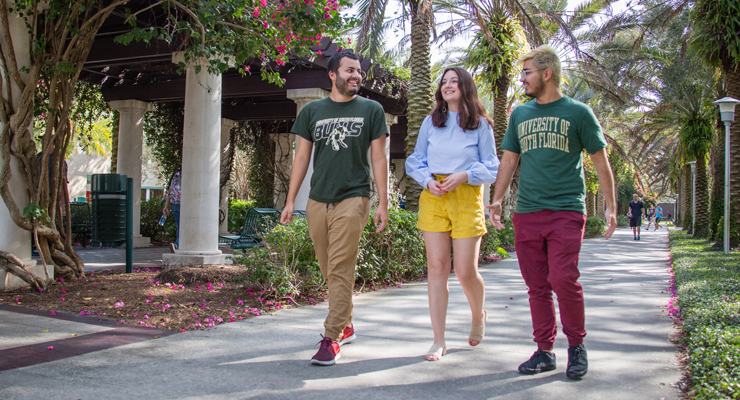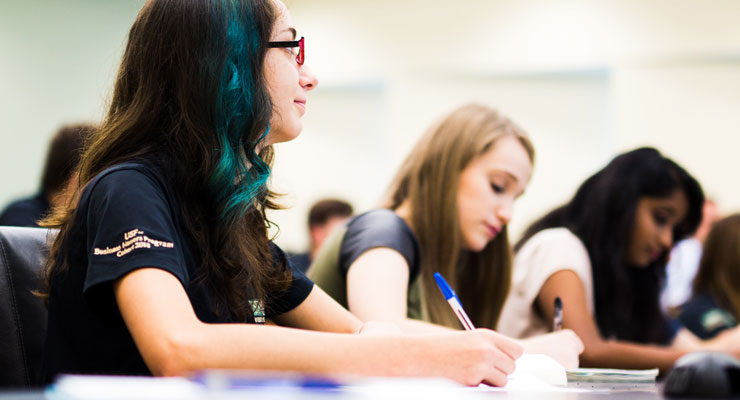
If you want to know how to use apps to succeed in college, just ask Stacey Neathawk.
Neathawk has big goals — both academically and professionally — and she’s well-versed in the tools she needs to achieve them. A junior at the University of South Florida, Neathawk is a biomedical sciences major in the pre-pharmacy track. She hopes to work as a pharmacist around the world.
“I’ve grown up as a military child. I’ve never lived in one place for three years,” Neathawk said, explaining her wanderlust. “My dream is to live abroad, (especially) in Dubai. I am also planning to look into working at a military hospital overseas in Italy or Germany if I am able to.”
A career in pharmacy would allow her to do what she loves, “which is helping people,” Neathawk said, but to gain admission to a pharmacy program, she must maintain high grades in challenging courses like anatomy. Along with taking notes in class, studying with friends in the library, and using USF’s Academic Success Center, Neathawk employs a variety of educational apps. These apps have helped her grasp difficult concepts and feel confident when it comes to exam day. “(M)y GPA is very good to get into … any pharmacy school that I’d want to right now,” she said.
Whatever your college goals are, you can help make them a reality with these 9 Apps College Students Actually Use.
Educational Apps
As a Peer Advisor Leader (PAL) in USF’s New Student Connections, Neathawk finds that new students sometimes have trouble “knowing how to study for classes.” She recommends the following apps — although she is quick to point out that everyone’s experience is unique, and success in college means finding the right tools for you.
Slader
About: Slader provides crowdsourced answers and explanations to textbook problems.
Cost: Free, but you can pay for an upgraded version.
Compatible with: iOS and Android
Highlights:
- Slader has been described as an “online study hall” because content is uploaded by fellow students.
- Subjects range from calculus to Latin.
Neathawk’s experience:
Neathawk credits Slader for helping her survive her calculus course. “When I didn’t understand how a question was done, I would go to Slader and watch them do it step by step,” she explained.
Neathawk said the app is controversial because some students use it “specifically to gain answers for homework,” rather than doing the work themselves. She benefited from the app because she used it “as a learning tool” that helped her understand how to solve the problems — not as a way to skip ahead to the answers. If you download Slader, make sure you follow Neathawk’s example and use it with academic integrity.
Study tip: Because information on Slader is uploaded by fellow students, it can be inaccurate. If you’re unsure about an answer, double-check it with your textbook’s solutions manual, Neathawk suggested.
Quizlet
About: Quizlet is an educational app that lets you use flashcard sets or create your own.
Cost: Free, although you have the option to purchase an upgraded version.
Compatible with: iOS and Android
Highlights:
- Quizlet is popular among college students: 1 in 3 use the app.
- You can use Quizlet for everything from test prep to language learning.
- Test your skills through games and quizzes.
Neathawk said that “Quizlet is phenomenal,” especially for “topics that require memorization.”
GroupMe
About: GroupMe is an easy-to-use messaging app designed for (you guessed it) groups.
Cost: Free
Compatible with: iOS and Android
Highlights:
- GroupMe offers a simple way to communicate with a technologically-diverse group of peers: The app claims “it works on nearly every phone, via push or SMS,” making it accessible for those without smartphones.
- You can use GroupMe to message people even if they don’t have the app.
- Fun features include the ability to send photos or videos, share locations, and use customized emojis.
Neathawk uses GroupMe to communicate with classmates, lab groups, fellow members of New Student Connections, her Pre-Pharmacy Society, and other student organizations. “It’s very easy to use and inclusive,” she said. The app is also visually appealing: “Whenever I’m texting somebody within a group chat, you can see who is texting because it shows … their picture as well as their name.”
Khan Academy
About: Khan Academy provides online educational resources, including thousands of instructional videos and practice exercises. Course subjects range from computer programming to test prep, as well as content from partners like NASA and the Museum of Modern Art.
Cost: Free
Compatible with: iOS and Android
Highlights:
- You can rewatch the short video tutorials as much as you want.
- Khan Academy’s math and science sections are especially robust, which isn’t surprising since the creator, Salman “Sal” Khan, boasts three degrees from MIT and a Harvard MBA.
- In tutorials, Khan is known for his accessible style and ability to clearly explain difficult concepts. (He started out making instructional videos as a side project to help his younger cousins understand math – and his YouTube viewership exploded into what would become the nonprofit academy.)
Neathawk’s experience:
“Khan Academy has basically been like my savior,” Neathawk said. She uses the app to master challenging subjects like chemistry, biology, organic chemistry, and anatomy. It’s not just college students who benefit from the app: Neathawk’s dad told her that he used Khan Academy to learn precalculus two years ago. “It works for everybody,” she said.
YouTube
About: We all know YouTube has excellent cat videos. But it also offers a ton of educational content.
Cost: Free
Compatible with: iOS and Android
Highlights:
- A section of YouTube is devoted entirely to learning.
- TedEd videos span subjects from literature to quantum mechanics.
- CrashCourse will teach you everything from world history to biology in 10- to 15- minute lessons. A perk: The video creators are popular authors Hank and John Green, and they know how to keep an audience interested.
- Khan Academy videos are also available on YouTube.
Neathawk’s experience:
If Neathawk had to use only one app on this list, she’d choose YouTube because of its wealth of information. She said she especially enjoys Hank Green’s anatomy and physiology lessons, which are animated with engaging illustrations that bring science to life.
USF Apps
Neathawk uses some campus-specific apps to help her make the most of her USF experience.
MyUSF Mobile
About: MyUSF is a launching pad for USF resources.
Cost: Free
Compatible with: iOS and Android
Highlights:
- You can use MyUSF to access your email and course details, set up advising appointments, and more.
Neathawk’s experience:
One of the coolest features on MyUSF is that it can help you get around campus: “If you don’t know where one of your classes is, it will locate you based off of your current location and (show you) how to … walk to that class on campus,” Neathawk said. She added that the app is more effective than Google Maps, because it’s “familiar with the buildings at USF Tampa.”
Go Bulls Guides
About: Go Bulls Guides makes it easier for students to get involved on campus.
Cost: Free
Compatible with: iOS and Android
Highlights:
- “(T)he New Student and Family guide within the Go Bulls Guides app allows for students to get involved on campus and know what events are coming up,” Neathawk said. You can filter events based on your standing. For example, first-year or commuter students can view the events that pertain to them.
- If you find an event you like, you can add it to your schedule and set a reminder.
Neathawk’s experience:
Neathawk describes Go Bulls Guides as fast, efficient, and “the least confusing app” she’s ever used. “I want to become more involved within my community this year — that’s one of my goals — and I will use this app to … help ensure that I do that,” she said.
Bonus: Entertainment and Life Apps
Reward yourself for a productive study session with these apps. Some of Neathawk’s favorite entertainment and life apps include:
Spotify Premium Student
About: Spotify Premium Student includes Spotify Premium, Hulu, and SHOWTIME.
Cost: $4.99 a month, plus tax
Compatible with: iOS and Android
Highlights:
- To receive the discount, students must be more than 18 years old and be enrolled at a US Title IV accredited college or university.
Neathawk’s experience:
“On Spotify I usually study to an artist named Milky Chance because of their mellow and chill vibe,” Neathawk said. She’s also used playlists such as Instrumental Study, All-Nighter, Intense Studying, and Just Focus.
Amazon Prime Student
About: Amazon Prime offers a student discount, including a six-month free trial.
Cost: $6.49 per month, or $59 per year
Compatible with: iOS and Android
Highlights:
- Free two-day and sometimes same-day delivery can be a lifesaver when you’re too busy cramming for exams to go shopping.
- You can use Prime to stream music, movies, and more.
Neathawk’s experience:
On Amazon Prime, Neathawk purchased decorations and bedding to transform her college living space into a “new home away from home.” She also recommends Amazon for renting or purchasing textbooks, because they are “usually cheaper when purchased through Amazon versus some other providers.”
Our Favorite Apps for 2020
We’ve added our own favorite apps for college students to Neathawk’s lineup of suggestions. Our choices are designed to help students tackle issues unique to the 2020 school year. They include apps for studying as well as apps for overall wellness.
Headspace
About: Headspace is a popular meditation app that teaches you mindfulness in 10-minute sessions a day.
Cost: A student subscription is $9.99 a year.
Compatible with: iOS and Android
Highlights:
- Once you master the basics of mindfulness, you can explore specific exercises that help you with everything from managing stress to unlocking creativity.
- We like Headspace because it's easy to use, with a fun, colorful interface that encourages you to progress through each session.
- The app also includes soothing sleep music and fitness sessions you can do from home.
Why It’s Our Choice for 2020:
We could all use some stress relief right now. Headspace doesn’t replace counseling or mental health services (which we recommend for everyone during this stressful year), but it can help you add a little self-care to your day. If you prefer alternatives to Headspace, you can view this list of wellness apps compiled by our counseling center.
Toggl
About: This simple app helps you track your time.
Cost: Free
Compatible with: iOS and Android
Highlights:
- Toggl works like a stopwatch: Press a green button when you start an assignment, type in what you want to call it (“Essay Outline”), and hit a red button when you stop.
- You’ll be able to see at a glance how long projects take and plan your schedule accordingly.
Why It’s Our Choice for 2020
Time management is a crucial skill for all college students to learn. If you’re attending online courses, as many students will do in fall 2020, it’s even more important to know how long projects take and budget your time effectively.
Google Docs
About: Google Docs is a word-processing software.
Cost: Free
Compatible with: iOS and Android
Highlights:
- We like Google Docs for three main reasons.
- First, the mobile app allows you to work on assignments wherever you are.
- Second, Google Docs has a built-in dictation feature, which means you can write the first draft of an assignment just by speaking into the app.
- Third, it lets you collaborate with other users on the same document.
Why It’s Our Choice for 2020
Between Zoom hangouts and online courses, we’re all spending more time hunched over our computers this year. That means we need to be intentional about weaving movement into the day. With Google Docs, you can dictate your thoughts while walking around your room or backyard – an ideal way to get work done and get some exercise. Plus, its collaborative features make it easier to do group projects remotely.
Ask a Librarian
About: Ask a Librarian allows you to, you guessed it, ask a librarian your most pressing questions about everything from research to MLA style.
Cost: Free
Compatible with: Florida residents can access the service here.
Highlights:
- Live chat is available until midnight most days of the week, so you can get the help you need during late-night cramming sessions.
Why It’s Our Choice for 2020
Social distancing means you may not be spending as much time in-person at a library. Ask a Librarian helps you stay connected with research librarians, who are arguably one of the most useful resources when you’re writing a paper or looking for sources.
We hope you enjoyed our list of college student apps! Do you want to learn more about study tools, recommended apps, or the college experience? Reach out to USF’s New Student Connections. You can also contact the USF Office of Admissions online.





